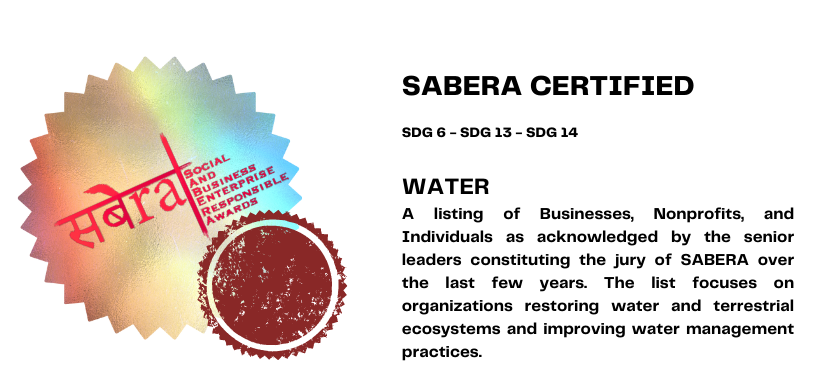Here we share a list of replicable best practices across INDIA as acknowledged by the SABERA JURY over the years.
From the rejuvenation of Hebbagodi lake in Bengaluru to the raising of the water table of the Krishna Yashoda River Basin. From removing 300 tonnes of waste from a river in Darjeeling to desilting lakes & recharging handpumps in the Marathwada region. From recharging 200 wells to providing potent water to tribals and reducing their migration from their native habitat.
This is a list of organizations that stand out with their outreach through SDG6, 13 & 14
Water is a vital resource for life on earth, and its conservation and restoration are critical for sustainable development. The SABERA platform has recognized the efforts of various corporations and non-profits in restoring water and terrestrial ecosystems and improving water management practices.
In 2018, Biocon Ltd’s Hebbagodi Lake rejuvenation project in Bengaluru was recognized for reviving 35 acres of lakes from pollution and man-made crises. The project involved eco-friendly measures such as constructing wetlands, creating an artificial island, and planting thousands of trees and shrubs. These efforts have helped to improve water quality, increase biodiversity and provide recreational space for the local community.
The RAAH Foundation’s intervention to stop the migration of 10,000 tribals in Maharashtra by providing access to potable water was also recognized in 2018. The project aimed to address the water scarcity in the region and improve the livelihoods of the tribal communities. The foundation implemented water harvesting techniques and constructed water tanks and pipelines to provide access to clean drinking water.
In 2019, the Sehgal Foundation was recognized for recharging 200 wells and irrigating 1000 acres of land. The foundation implemented innovative methods such as rainwater harvesting and soil conservation techniques to improve groundwater levels and irrigation. These efforts have helped to increase crop yields and improve the livelihoods of local farmers.
The Bajaj Foundation was recognized in 2020 for its rejuvenation of the Yashoda River basin in Madhya Pradesh, which raised the water table by six feet. The project involved the construction of check dams, afforestation, and the promotion of sustainable farming practices. These efforts have helped to improve water availability, enhance biodiversity, and improve the livelihoods of local communities.
In the same year, Perfetti Van Melle was also recognized for their efforts in water conservation and access to potable water in the areas of operation, namely Chennai, Manesar, and Rudrapur. The project involved the implementation of water management techniques such as rainwater harvesting and wastewater treatment, and the provision of access to safe drinking water for local communities.
In 2021, grassroots worker Lahu Gaikwad was recognized for his efforts in desilting lakes and rejuvenating hand pumps in the interior regions of Marathwada. The project involved mobilizing the local community and implementing innovative techniques such as the use of bullock carts to remove silt from lakes. These efforts have helped to improve water availability and quality and have also provided employment opportunities for local communities.
In 2022, TEEIDI, a grassroots organization, was acknowledged for its efforts in removing 300 tonnes of waste from the river. The project involved the mobilization of volunteers and the use of innovative techniques such as the installation of trash traps to remove waste from the river. These efforts have helped to improve water quality and enhance biodiversity in the region.
In conclusion, the SABERA platform has recognized various initiatives aimed at restoring water and terrestrial ecosystems, improving water management practices, and enhancing biodiversity. These efforts are critical in addressing the global water crisis and ensuring a sustainable future for generations to come. The #AcceleratingChange theme for World Water Day 2023 highlights the urgency of taking action to achieve water security and sustainability for all.
As Dr. Rajjender Singh the Water Man of India stated on the SABERA platform – The Indian civilization taught us to nurture nature and not exploit it, though technological innovation seems to have relied on the latter. It’s essential we use all advancements to restore the balance of nature including water bodies and terrestrial ecosystems.
Follow us on Linked, Twitter, and YouTube to never miss an update from SABERA. To submit your SDG-aligned campaigns for SABERA 2023 jury to evaluate, Register here.


